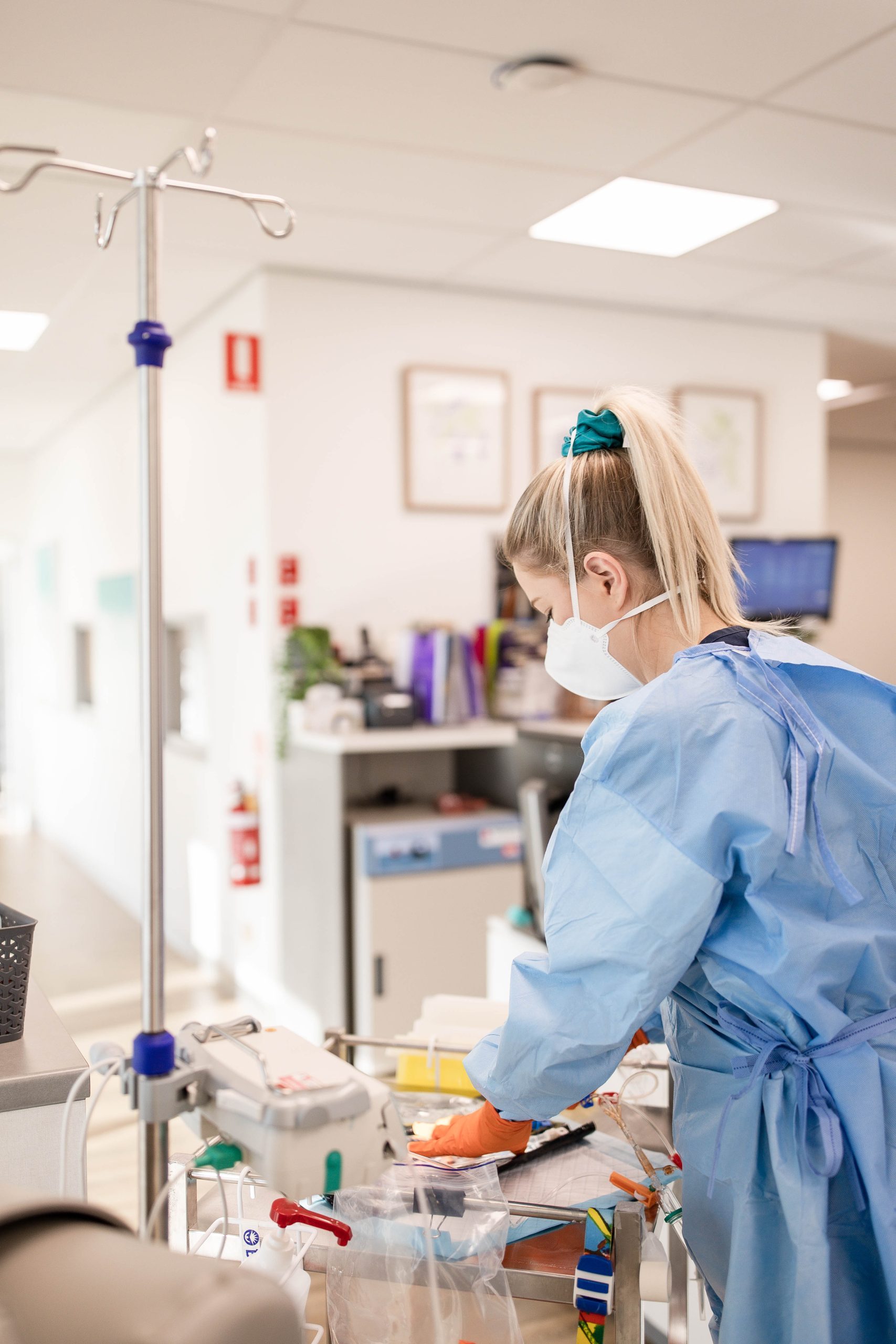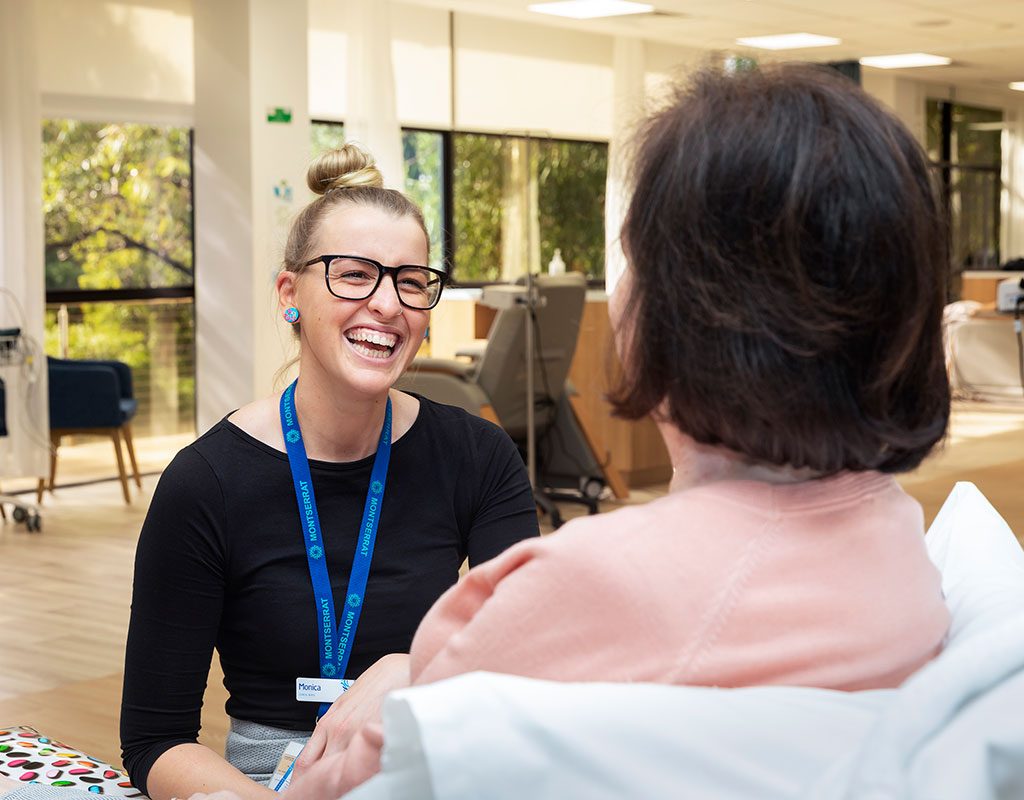Western Haematology and Oncology Clinics’ Commitment to Patient Safety and Quality
Western Haematology and Oncology Clinics’ are passionate about providing the highest quality healthcare to every patient through personalised treatment plans.
We draw on our expertise in haematology and oncology, workplace culture and values, corporate and clinical governance and our business operations and support systems to provide patients with specialised care in the safest environment.
As we are owned and operated by Montserrat Day Hospitals, a national provider of premium hospital and cancer care, we use Montserrat’s robust Quality Management System (QMS) to
- Monitor patient satisfaction, outcomes and safety initiatives
- Manage and mitigate risks, and
- Identify professional development opportunities for our staff
We have a highly skilled team of specialists, allied health professionals, nurses and support staff, and a firm commitment to continually invest in state-of-the-art medical equipment.
Our Clinics are dedicated to exceeding the National Safety and Quality Health Service Standards (NSQHS) – the national benchmark that all cancer care clinics and hospitals Australia-wide must meet to maintain their licensing and accreditation status.
Below we discuss our approach to the National Standards and report on several clinical indicators, including:
- Patients’ experience
- Feedback and complaints
- Hand hygiene compliance rates
- Incidents of Falls
Clinical Governance
Western Haematology and Oncology Clinics has a united, integrated approach to patient care. It’s not just our specialists, but our entire workforce who have accountability to our patients to ensure the delivery of our healthcare is safe, effective, integrated, high quality and continuously improving. That is our commitment.
We gather important information across all aspects of our clinics to continuously improve the safety, effectiveness and quality of our services. We use clinical governance systems across all levels of our organisation to achieve, monitor and regularly review our safety and quality performance.


Preventing and Controlling Infections
For the safety of our patients and visitors, Western Haematology and Oncology Clinics implements the highest standards in infection prevention and control including:
- Hand hygiene
- Use of Personal Protective equipment
- Safe use of disposal consumable equipment
- Routine Cleaning
We know the best way to stop germs from spreading and have best practice measures in place to support this, particularly with hand hygiene, sterilisation techniques and the use of protective equipment. We operate a well-maintained facility that is optimised for patient flow. We are pleased to report a 93% compliance rate in hand hygiene for the last reporting period.
Hand Hygiene Compliance Rate (31st October 2022)
Patient Satisfaction and Experience
Patient feedback is an important aspect of our patients’ journey as it not only ensures that our patients’ voices are heard, but by examining patients’ feedback it gives direct insight into our quality of care and patient satisfaction which identifies areas of improvement. Patients are encouraged to provide feedback through electronic surveys or by submitting the feedback form included in their welcome packs. The relationships we form with patients and families over time is an additional avenue for receiving quality, insightful feedback.
We are delighted to report a high level of satisfaction from surveyed patients, the majority of whom provided positive feedback about their experience at our clinics from October to December 2022. We cared for 1087 patients during this time and no complaints were received.

Comprehensive Care

Western Haematology and Oncology Clinics provides ongoing, collaborative care to patients in partnership with their healthcare team, carers and families.
Our clinics have integrated systems in place supporting our specialists and allied health team to deliver comprehensive, quality healthcare whilst mitigating and managing the risk of harm.
All specialists at our clinics undertake a screening and assessment process with patients to identify potential risks that could be associated with the delivery of healthcare. Patients, their carers and families are consulted as part of this process to develop goal-oriented, comprehensive care plans.
If a patient is at risk of harm, our specialists will deliver targeted, best-practice strategies to prevent and manage this from occurring. Safely managing transitions between episodes of care, and ensuring a continuum of comprehensive care are standards our medical experts abide by.
Communicating for Safety
One of the best ways we coordinate safe patient care is through communication and documentation with our patients, carers and families, multidisciplinary teams and specialists, and all business units across our organisation.
Effective communication and documentation help to mitigate high-risk situations and manage patient safety. Western Haematology and Oncology Clinics has formal processes in place to manage patient records, individual treatment plans, and clinical handovers when information about a patient’s care emerges or changes.
Informed Consent
Prior to commencing treatment at our facility, each patient must provide their informed consent, which is their decision, given voluntarily, to agree to receive healthcare treatment.
Our specialists’ duty of care is to provide each patient with accurate and relevant information about their medical diagnosis and the different treatment options available, the potential outcomes, risks and benefits and what this might mean for them. It’s through this process of communication, documentation and shared decision making that a patient and their specialist can agree on the most suitable form of treatment and informed consent is then provided. The need to obtain informed consent may be required at different stages throughout a patient’s treatment pathway and our clinic reviews this regularly.
A patient has the right not to consent should they decide not to proceed with treatment as informed consent is completely voluntary.
Learn more about our expertise in the following areas of patient care:
Western Haematology and Oncology Clinics uses a combination of clinical governance and quality improvement systems to appropriately manage a patient’s own blood, as well as any blood or blood products. Safety systems are in place and every care is taken to safely administer blood products to each intended patient, and closely monitor and report any adverse reactions or incidents. We find this dual approach to blood management and patient care is the most effective way to ensure the appropriate and safe use of blood and blood products at our clinics.
All medical and support staff at Western Haematology and Oncology Clinics have a duty of care to recognise and promptly respond to changes in a person’s physiological, cognitive or mental state, otherwise known as acute deterioration. Providing patients with appropriate and timely care is part of our organisation-wide recognition and response system when acute deterioration is identified.
Early detection is critical in these situations as it may improve outcomes and lessen the intervention required when treating the patient. At Western Haematology and Oncology Clinics we understand the importance of identifying and acting on the warning signs of clinical deterioration efficiently and appropriately. Management of these circumstances draws on our approach to comprehensive care and communication and documentation for safety.
Having a highly-skilled healthcare team who understand the signs and symptoms that could signal acute deterioration, combined with our safety, quality and patient monitoring systems all help to recognise acute deterioration.
Safety reporting systems are a very important aspect of ensuring patient safety at our clinics. Detecting incidents such as slips or falls at our clinic enables us to improve practice and prevent any future adverse events. We are pleased to report no incidents of falls at Western Haematology and Oncology Clinics for the October to December 2022 period.
Incidents of Falls
(Oct to Dec 2022)
[TOTAL PATIENTS - 1087]
Medicines are the most widely prescribed treatment in haematology and oncology healthcare and contribute significantly to improvements in patients’ health when managed appropriately. Western Haematology and Oncology Clinics has robust medication safety systems in place to accurately and safely prescribe, dispense and administer the appropriate medicine to patients and monitor medicine use.
Our specialists’ duty of care ensures patients are informed about and understand their individual medical needs, and associated risks. Before commencing a patient’s treatment plan, our specialists will source a patient’s best available medication history and have this on record. We ask patients for full disclosure about their medication history in our preliminary Health Assessment Form. Our clinic partners with community pharmacy providers to ensure our patients get the right medication and education. Should a patient undergoing treatment experience a reaction to their medication, our clinic has clear processes in place to respond efficiently and appropriately.
Western Haematology and Oncology Clinics partners with consumers and patients as this has proven beneficial in the planning, design, delivery and evaluation of our clinics. We place great importance on these partnerships as they help to guarantee quality outcomes, whilst also benefiting patients’ carers and families and more broadly the healthcare industry.
More broadly we partner with our patients and consumers in the following ways:
- The relationship between our specialists and patients at the point of care; a relationship founded on our values of respect, integrity, collaboration, innovation and compassion.
- Patients, carers, families and involvement in planning, implementing and evaluating change at the department level.
- Consumers or patients’ involvement in the governance, policy and planning of our healthcare service. Key areas focused on at this level include patient safety, quality improvement, patient or family education, professional development, ethics and research. Partnerships with the broader community may also occur at this level.
